In pursuit of excellence: level 3 strength and conditioning course
“Perfection is unobtainable, but if we chase perfection we can catch excellence”
Vince Lombardi
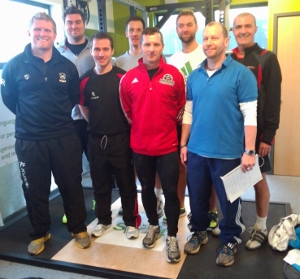 This was the underlying theme of the first weekend of the Level 3 strength and conditioning course .
This was the underlying theme of the first weekend of the Level 3 strength and conditioning course .
Rather than chase 1001 new drills and exercises, we concentrated on refining what we already did, and look at ways of coaching it better.
The candidates are all Level 2 S&C coaches already, with most of them being coaches in their own sport too. This meant they were familiar with a lot of exercises, basic planning and how it impacts their athletes.
The level 3 looks a lot more at yearly planning and the sequencing of sessions around sports practice. I have seen other coaches desperately trying to fill out there folder the day before their level 3 sports course and I wanted none of that short cutting here.
Rather than wallowing around in a cesspit of mediocrity, I want this group of candidates to dig deep, challenge themselves and each other. This means having standards.
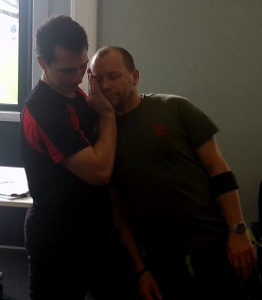 Whilst Bill Sweetenham may have taken it too far by saying “compromise is a cancer“, I see far too many coaches settling for second best, or letting poor sloppy, techniques and habits slide.
Whilst Bill Sweetenham may have taken it too far by saying “compromise is a cancer“, I see far too many coaches settling for second best, or letting poor sloppy, techniques and habits slide.
Standards mean precision in execution, being a role model, and knowing your scope of practice.
(In case you think I am being elitist, I am talking about standards at every level: I turn up on time, professionally dressed and try my hardest every week when dealing with 5 yr olds in the Willand school playground for “wake n’ shake“).
“Get the athlete to leave the building with something”
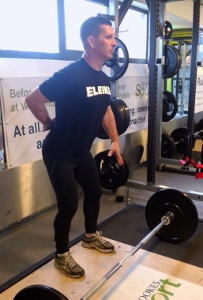
Marius
was one of Marius Hardiman’s coaching tips on the weightlifting workshop. It is easy for athletes to get demoralised (especially when doing lifting where often the last lift is a failed attempt) so Marius gets them to finish with a “win” like doing back squats.
This 3 hour part of the course was an excellent example of an expert in their field providing not only technical knowledge but simple coaching cues (Marius is an ex lifter and Head Coach at Oxford Power Sports pictured with candidates).
We looked at preparation before lifting, snatch progressions and finally the “stuff for neanderthals” the clean and jerk.
What I especially liked was how Marius had a Plan B and a Plan C for when each lifter, in case they found a derivation or progression tricky. Sometimes this was a completely different exercsie; but more often it was a subtle tweak of position or emphasis.
I was conscious about this all relating back to training for sport, so we had lots of talk about how we apply this in rugby, rowing, cricket and tennis. Although Marius doesn’t work with footballers “because they ain’t hard enough“!
“What is the most important attribute in an athlete?”
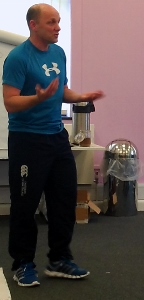
Andy
asked our 2nd Guest Tutor Andy Ellis. I had asked Andy to review exercise anatomy and physiology, and get the coaches to see how and when they can use it to underpin their decision making.
Although Andy did cover some of the detail such as “Hydrogen ions are the evil thing“, he mostly challenged the coaches to ask more questions. They needed to be questioning all the time: especially when reading research papers!
“Need and struggle are what excite and inspire us; our hour of trimuph is what brings the void” William James.
Andy talked about working with athletes in the 16-18 year age group (his main area of experience). A good tip was to find the most important things that are going to stop them from developing. In this age group it is normally peer pressure.
He then gave some good advice on “trusted sources”of advice, which is important when filtering out the enormous amount of “noise” that is published each year. “This is what I know now” was Andy’s preface to statements, admitting that this is a changing ladnscape, so we have to be careful at being dogmatic.
Interestingly, in what was supposed to be an 2 hour presentation on physiology, Andy kept referring back to “attitude” of the athlete and the coaches.
Summary
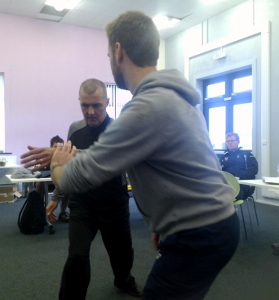 Due in some part to me having a sore throat, this weekend was highly interactive, with a lot of questions and practical demonstrations from the coaches (Mark showing Duncan some pushing hands).
Due in some part to me having a sore throat, this weekend was highly interactive, with a lot of questions and practical demonstrations from the coaches (Mark showing Duncan some pushing hands).
If, indeed, learning is a “social phenomenon” and an “active process” we may be on track.
I am looking forward to the next weekend when the coaches present their findings on performance benchmarks for their sports.
John Brierley will be presenting on skill development and also his experiences running the Athletics Teams at the Delhi Commonwealth games.
If you are interested in joining the Excelsior community of practice, then book onto one of our coaching courses.

James,
Thanks for an enjoyable weekend. As always, I learned a lot (not just about strength and conditioning but also about the coaching process) and I’m looking forward to finding out what the next module has in store for us.
If I was to summarize just a few of my key learning points they would be:
– Make sure the tests reflect the demands of the sports and the training methods you are going to implement.
– Understand the drills by practicing them yourself.
– How to organise the training process into a sequential manner, and understanding how the foundational work (hip series, core pillar, 5x5x5 etc) links to sport performance.
See you all in a couple of weeks time,
Dean
The first day really set up the way the course was going to work. It took me out, at times, of my comfort zone, challenged the way I held held certain things, inspired
me to take on-board information shared across the group and course.The reason for booking on was to up skill, deepen my knowledge and look at best practice. By the
end of the 2 days I can see that the Level 3 will deliver in those areas.
I have attended events/workshops where those attending were closed and unwilling to share their experience unless it was to tell you how great their programme/set up is. The group attending were refreshingly open and generous.The activities James shared on the first day illustrated how a structured, progressive and integrated training should work and why it is important to keep your own training up if you want to show and tell!
The second day with Marius Hardiman on Olympic Lifting was refreshingly simple which only someone with a lifetime of experience can do. I had loved my first
training in Olympic Lifting a few years back with someone who was a British and Commonwealth Champion. It was both simple and challenging. Recently though, through another governing body the methods and instruction in lifting were misleading and made me question what I had understood previously. I was relieved to hear from Marius who has lifted from the age of 13 yrs old on how we can teach and take
advantage of the physical gains that lifting can bring to a conditioning programme.
Marius at 5’6” and at 43 yrs old demonstrated the strength and power gains that all athletes can potentially develop through his own example of physique and skills.
Andy Ellis on Physiology made what can be a heavy scientific area, relevant, clear and full of common sense. His teaching background made the subject accessible to me in a way I have not experienced before. Andy made it clear he is open to new data and
comfortable with how it can put into doubt, currently perceived wisdom. His ‘this is what I know now’ leaves the door open to new science while understanding the things that time has shown us works.Looking forward to next month.
Mark
Hi James,
Thanks again for the first weekend of the course. A really insightful two days with much learnt and much to go away and reflect upon and put into practice.
The 5 things I took away from the course, although I did take away a lot more, are as follows (some have been mentioned above):
1) It’s all in the detail(s)
Coaching is about aiming for precision and therefore if something isn’t being executed to the required standard, don’t be afraid, and have the confidence, to tell and correct individuals. Therefore, it’s important for coaches to continually practice what they coach so that high levels of precision can be achieved.
2) Coaching is a human process
Coaching deals with individuals rather than averages. Therefore it’s important to consider not only the physical aspects of training but also the mental aspects. For example knowing when to cut drills or exercises for that individual’s sake so that the chances of them developing negative thinking are reduced, and how to structure sessions/ activities so that individuals go away feeling positive.
3) There isn’t a perfect programme
Although there are certain principles to adhere to with regards to programming, the perfect programme doesn’t exist. Programmes are a combination of compromises.
4) Simplicity at all time
Keep everything simple, especially coaching cues
5) Why?
Always ask yourself why I am doing this session and/or exercise
Have clear objectives about what you are aiming to develop and why
Looking forward to the next part of the course
Many thanks,
Ollie
James
A thoroughly enjoyable first weekend to the course, plenty learnt from the guests, yourself and from the other coaches.
Right from the start we knew it wasn’t going to be us just listening the whole time, we were actively involved in discussions and coaching which keeps you engaged and helps the learning process.
A couple of reflections that I made over the weekend
1. I need to practice coaching and working through progressions, simply practicing the exercise doesn’t mean I can coach it.
2. I need to question everything I do more, this will help write programmes and explain them to athletes, parents and coaches
3. How important it is to work with good coaches who want to progress and share information
I feel the course is going to progress my coaching ability and my knowledge which were my aims going into it, there are too many courses that just give information and forget we need to be able to coach too.
Thanks: who are you?
Hi James,
Thanks for a rewarding and thought provoking first weekend of the course. I felt the environment was extremely different to other coaching course/CPD events I had been on before. The coaches were happy to share good practise and I felt very comfortable with the open discussions we had. Overall the weekend had a great atmosphere which fostered great debate.
Take home points for me:
1) Static Screening: Vitally important to see how the athlete can move, if they can complete the movement slowly then add speed to see how the movement adapts.
2)Structural Integrity 101: Many of these exercises were fun and simple but needed whole body strength and control. I have already started to use these exercises with my rugby boys, who are finding them surprisingly difficult.
3) Weightlifting: The 3 hour session with Marius was filled with expert knowledge, but taught in such a simple way. Why overcomplicate something when actually it is not that hard a concept to get to grips with.
4) Coaching cues: Again simple and effective, but I personally need to use more visual and kinesthetic cues as I mainly rely on verbal cues.
5)Practise what you preach: This is especially true of new exercises that you wish to bring in to your own athletes. For me it is the Sway and Wheel drill, both of which I had never seen before until the level 3 weekend.
Looking forward to learning and sharing more ideas on the next weekend
Brett
Crew,
THANK YOU
Sorry for the delay in this, mum’s health put a spoke into the wheel.
It was a great weekend and I walked away stronger and better for it.
I agree with Brett totally on the points raised, Static Screening, Structural Integrity, Weightlifting and coaching cues.
I am looking forward to this weekend very much. I no doubt will be put though my paces outside, all outside my comfort zone, but all stuff that I disguise and dovetail into my land training sessions.
The Cygnet Rowing Club (Men’s Civil Service) at Barnes Bridge London all love the stuff. We call it ‘Breakdancing’.
One of the nicest bonuses of the weekend was interacting with coaches from other disciplines.
See you in 48 hrs.
THANK YOU
Best wishes,
Greg
[…] In pursuit of excellence […]